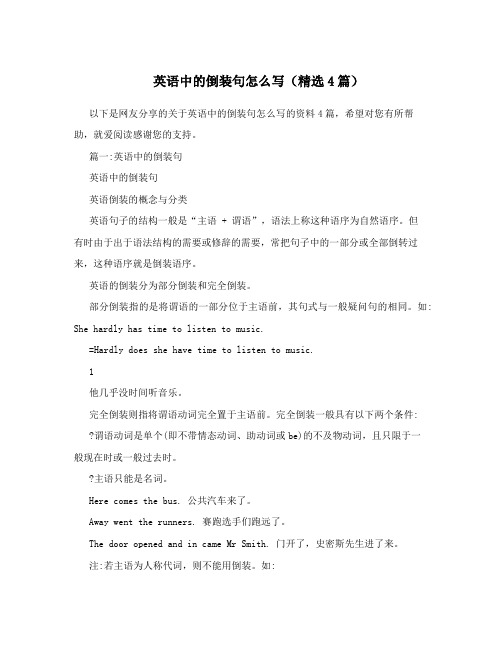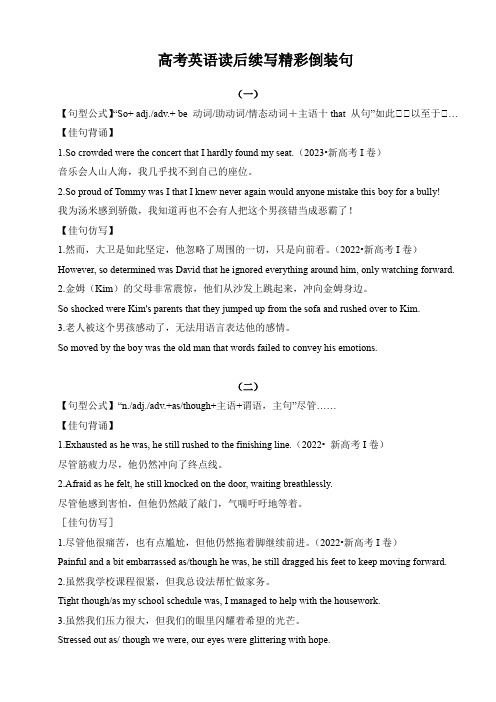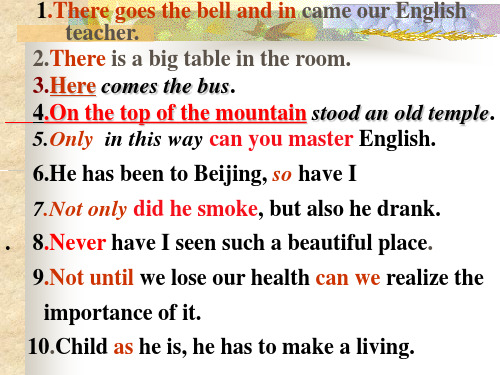高中英语倒装句(精品8篇)
高中英语倒装句

• 1) Only修饰的副词,介词短语或状语从 句放在句首时,主句要进行部分倒装。
• 只有到了那个时候,他才知道知识的重 要性。
• Only then did he know the importance of knowledge.
• 只有我们自己才能拯救自己。 • Only we ourselves can save
• 2. At the foot of the mountain ____________.
• A. a village lies • B. lies a village • C. does a village lie • D. lying a village
2. 倒装句之部分倒装
部分倒装是指将谓语的一部分如助动 词或情态倒装至主语之前。如果句中 的谓语没有助动词或情态动词,则需 添加助动词do, does或did,并将 其置于主语之前。
little dog.
• 一座碉楼座落在山顶上。
• A watchtower stands on top of the hill.
•
On top of the hill stands a
watchtower.
• 我们学校江边 有一个“希望 之星”的雕塑。
• On the riverside lies a statue, the star of hope.
Here comes the bus.
• 那个男孩走开了。
• Away went the boy.
• 小孩子冲了出来。
• Out rushed the children.
• 他走开了。 Away he went.
• 这是你的信。 Here is your letter.
英语中的倒装句怎么写(精选4篇)

英语中的倒装句怎么写(精选4篇)以下是网友分享的关于英语中的倒装句怎么写的资料4篇,希望对您有所帮助,就爱阅读感谢您的支持。
篇一:英语中的倒装句英语中的倒装句英语倒装的概念与分类英语句子的结构一般是“主语 + 谓语”,语法上称这种语序为自然语序。
但有时由于出于语法结构的需要或修辞的需要,常把句子中的一部分或全部倒转过来,这种语序就是倒装语序。
英语的倒装分为部分倒装和完全倒装。
部分倒装指的是将谓语的一部分位于主语前,其句式与一般疑问句的相同。
如: She hardly has time to listen to music.=Hardly does she have time to listen to music.1他几乎没时间听音乐。
完全倒装则指将谓语动词完全置于主语前。
完全倒装一般具有以下两个条件: ?谓语动词是单个(即不带情态动词、助动词或be)的不及物动词,且只限于一般现在时或一般过去时。
?主语只能是名词。
Here comes the bus. 公共汽车来了。
Away went the runners. 赛跑选手们跑远了。
The door opened and in came Mr Smith. 门开了,史密斯先生进了来。
注:若主语为人称代词,则不能用倒装。
如:Away he went. 他跑远了几类常见的部分倒装句类型1. 否定型倒装在正式文体中,如果将never, seldom, rarely, little, hardly,scarcely, no sooner, no longer, nowhere 等含有否定意义的副词若位于句首,则其后的句子要用部分倒装。
如: 后来我再也没见到过他了。
I never saw him again.?Never did I see him again.他很少出去吃饭。
He seldom goes out for dinner.2?Seldom does he go out for dinner.1她几乎没时间听音乐。
高中英语应用文作文倒装句

高中英语应用文作文倒装句Here is an essay on the topic of "Inverted Sentences in High School English Applied Writing" that is written in English and contains more than 1000 words.Inverted Sentences in High School English Applied WritingInverted sentences, also known as sentence inversion or subject-verb inversion, are a grammatical structure in which the usual order of the subject and verb is reversed. This technique is commonly used in English writing, particularly in formal or academic contexts, to achieve various stylistic and rhetorical effects. In the context of high school English applied writing, the use of inverted sentences can be a valuable tool for students to enhance the clarity, emphasis, and sophistication of their written work.One of the primary reasons for employing inverted sentences in high school English applied writing is to create a sense of emphasis or importance. By placing the verb before the subject, the writer can draw the reader's attention to a particular element of the sentence, often the action or the main idea. This can be especially effective when used in the opening or closing of a paragraph or essay, as itcan serve to highlight a key point or leave a lasting impression on the reader.For example, consider the following two sentences:"The student completed the assignment on time.""Completed the assignment on time, the student did."In the second sentence, the inversion of the subject and verb places the emphasis on the action of completing the assignment, rather than the subject (the student). This can be a powerful technique for emphasizing the importance of a particular event or outcome, or for creating a sense of urgency or immediacy in the writing.Another common use of inverted sentences in high school English applied writing is to achieve a more formal or academic tone. Inverted sentences are often associated with a more sophisticated and elevated style of writing, which can be particularly useful in formal essays, research papers, or other academic contexts. By incorporating inverted sentences into their writing, students can demonstrate their command of the English language and their ability to craft complex and nuanced sentences.For instance, consider the following sentence:"Not only did the student excel in the class, but she also received an award for her outstanding performance."In this example, the inversion of the subject and verb in the first clause ("Not only did the student excel") creates a more formal and academic tone, which can be appropriate for a high school English applied writing assignment that requires a higher level of discourse.Additionally, inverted sentences can be used to achieve a specific rhetorical or stylistic effect, such as creating a sense of balance or symmetry in the writing. By mirroring the structure of one sentence in the next, the writer can create a sense of rhythm and flow that can enhance the overall coherence and clarity of the text.For example:"Difficult was the task, but determined was the student. Persevering through the challenges, she ultimately succeeded in her goal."In this case, the use of inverted sentences in the first and third clauses creates a parallel structure that helps to emphasize the contrast between the difficulty of the task and the student's determination and perseverance.Of course, it is important to note that the use of inverted sentencesshould be done with care and in moderation, as overuse can result in a stilted or unnatural-sounding writing style. Students should strive to use inverted sentences judiciously, and only when they serve a clear stylistic or rhetorical purpose within the context of their high school English applied writing assignments.In conclusion, the use of inverted sentences can be a valuable tool for high school students in the context of English applied writing. By creating emphasis, achieving a more formal or academic tone, and enhancing the overall coherence and flow of their writing, students can leverage the power of sentence inversion to elevate the quality and effectiveness of their work. As with any writing technique, however, it is important for students to use inverted sentences thoughtfully and with a clear understanding of their purpose and impact.。
高中英语倒装句

高中英语倒装句1. 什么是倒装句倒装句是英语语法中常见的一种句式结构,它的主语和谓语的位置发生了倒置。
一般来说,倒装句分为完全倒装句和部分倒装句两种形式。
完全倒装句是指将谓语动词放在主语之前,主语则放在动词之后。
例如:•Never have I seen such a beautiful sunset.•Rarely does she go to the cinema.•Little did I know what awaited me.部分倒装句是指将助动词、情态动词或者系动词放在主语之前形成倒装。
例如:•Are you ready?•Can you help me?•Is he a student?2. 完全倒装句的构成完全倒装句的基本结构是:助动词/情态动词/系动词 + 主语 + 谓语。
当句首是否定词、副词、以及表示部分否定的词汇时,就需要使用完全倒装句。
下面是一些例子:•Never have I seen such a talented musician.•Rarely does he get up early on weekends.•Seldom do you find such a peaceful place in a bustling city.需要特别注意的是,当主语是第一人称时,助动词/情态动词/系动词也需要做相应的变化。
例如:•Little did I realize that time would fly so fast.•Only can we learn from our mistakes.•Not until recently have I started learning French.完全倒装句主要用在以下几种情况下:2.1 否定词+动词以否定词开头的句子,通常需要使用倒装结构。
例如:•Never have I seen such a beautiful sunset.•At no time did she mention her plans to me.2.2 副词/短语有些副词或短语放在句首时,也需要使用倒装结构。
高中英语语法之——倒装句

3于. s另o 一放人句;首,表示前面所说的情况也适用 He likes rice very well. So do I. He can ride a bike. So can I.
n也ei适th用er,于n另or一放人句.首,表示前面所说的情况 I have never been abroad. Neither has he. I didn’t read the notice on the blackboard, nor did he.
Hale Waihona Puke 部分倒装: 1.否定词或半否定词放句首时。 Never shall I forget it. Not a single mistake did he make. Not only was there no electricity, but also no water. 2 “only+状语” 位于句首时。 Only then did I realize that I was wrong. Only in this way can you learn from your friends. Only when the war was over in 1949 was he able to get back home.
全部倒装
1.
介词短语放句首,且谓语为不及物动词 的句子
On the wall hangs a map of China.
放2.句he首re,, th且er主e,语ou不t,是aw人ay称, u代p,词d的ow句n等子副。词 Here comes the bus. There goes the bell. Out rushed the children. Away went the boy.
高二英语倒装句-经典教学教辅文档

(3) 含否定意义的句型中:
1) Hardly
2) Barely + 半倒装 式
+ when + 陈述句形
3) Scarcely 即: had + 主+ Vpp…
(Ved)
4) No sooner + 半倒装(had+主+Vpp…)+ than +陈述句 (Ved)
5)Hardly/Barely/Scarcely had he arrived at the station when the train began to leave.
(7)、省略if的虚拟条件句
Were
were
Should +主… =if +主 + should …
Had
had
Were I a bird, I would fly in the sky.
Should it rain, the crops would grow better.
Had you my troubles, you would despair.
3.Not until yesterday did I learn anything about it.
4.注意: 下面句子不倒装(强调句式)
高考英语读后续写精彩倒装句清单(共四组)

高考英语读后续写精彩倒装句(一)【句型公式】“So+ adj./adv.+ be 动词/助动词/情态动词+主语十that 从句”如此⋯⋯以至于⋯…【佳句背诵】1.So crowded were the concert that I hardly found my seat.(2023•新高考I卷)音乐会人山人海,我几乎找不到自己的座位。
2.So proud of Tommy was I that I knew never again would anyone mistake this boy for a bully!我为汤米感到骄傲,我知道再也不会有人把这个男孩错当成恶霸了!【佳句仿写】1.然而,大卫是如此坚定,他忽略了周围的一切,只是向前看。
(2022•新高考I卷)However, so determined was David that he ignored everything around him, only watching forward.2.金姆(Kim)的父母非常震惊,他们从沙发上跳起来,冲向金姆身边。
So shocked were Kim's parents that they jumped up from the sofa and rushed over to Kim.3.老人被这个男孩感动了,无法用语言表达他的感情。
So moved by the boy was the old man that words failed to convey his emotions.(二)【句型公式】“n./adj./adv.+as/though+主语+谓语,主句”尽管……【佳句背诵】1.Exhausted as he was, he still rushed to the finishing line.(2022• 新高考I卷)尽管筋疲力尽,他仍然冲向了终点线。
2.Afraid as he felt, he still knocked on the door, waiting breathlessly.尽管他感到害怕,但他仍然敲了敲门,气喘吁吁地等着。
高中英语语法——倒装句

There goes the bell. In came the teacher and the class began. Out rushed the man and his son. Down came the master from the upstairs. 名词 Away went the little boy to the school. Now comes your turn. Then followed three days of heavy rain.
3.If Joe’s wife won’t go to the party,
____. (2007全国) A. he will either B. neither will he C. he neither will D. either he will
2.以only修饰的副词、介词短语或状语从句放句
部分倒装
部分倒装是把be动词、情态动词、助动词 放到主语之前。如果句子中没有这些词,要在 主语之前加助动词do / does / did等,而把原来 的谓语动词变成原形放在主语之后。
1.用于so, nor, neither 开头的句子
此类倒装用于重复前句部分内容 前句是肯定句用so 某人/某事也是 前句是否定句用neither 或 nor某人/某事也不 是 倒装句中的谓语应与前句的谓语时态一致。 He has been to Beijing. So have I. Tom can’t answer the question. Neither /Nor can I .
Many students are there in the classroom.
2.当here; there; now ; then; up; down; in; out; away; off; over 等表示地点或时间的副词 位于句首时,且主语为名词时,句子要用全部倒装.
- 1、下载文档前请自行甄别文档内容的完整性,平台不提供额外的编辑、内容补充、找答案等附加服务。
- 2、"仅部分预览"的文档,不可在线预览部分如存在完整性等问题,可反馈申请退款(可完整预览的文档不适用该条件!)。
- 3、如文档侵犯您的权益,请联系客服反馈,我们会尽快为您处理(人工客服工作时间:9:00-18:30)。
高中英语倒装句(精品8篇)高中英语倒装句(1)句首为否定或半否定的副词或连词。
如no, not,never, seldom, little, hardly, scarcely, rarely, at no time 决不, by no means, on no account, inno case, many a time, under no circumstances, in no way, many a time, not until…等。
例如:He cares little about his= Little does he care about his他不在乎穿着。
I have never seen him= Never have I seen him= Never before have I seen我以前没见过他。
The mother didn't leave the room until the child fell= Not until the child fell asleep did the mother leave the孩子睡着了,妈妈才离开房间。
(Not until引出的主从复合句中,主句倒装,从句不倒装。
即:后倒前不倒。
注意:如否定词不在句首不倒装。
)例如:Churchill was not only a statesman, but a= Not only was Churchill a statesman, but a丘吉尔不仅是个政治家,而且还是个诗人。
I shall by no means give= By no means shall I give 我决不放弃。
高中英语倒装句(2)当if引导的虚拟条件从句中含有had, were, should等时,如将if省略,则要将had, were, should等移到主语前,构成倒装句:Had you come yesterday, you would have seen若你昨天来,你就会见到他了。
Should you require anything give me a如果需要什么,可以给我打电话。
Were it not for your help, I would still be要不是你帮助,我会仍然无家可归。
注意:省略if后提前的had不一定是助动词Had I money, I would buy 假若我有钱,我就会买它。
高中英语倒装句(3)Are you cold?Does he go to school by bike?注意:若疑问词在句中作主语或主语的定语时,不倒装。
Who is your English teacher?Whose father is a worker?There be 句型在There+助动词/情态动词+be+主语+地点/时间的句型中,主语在谓语be动词后面,因此这是倒装。
There is a mobile phone and some books on the桌上有一个手机和一些书。
There are thousands of people gathering on the广场上聚集着成千上万的人注意:引导词there 还可以接appear,exist, lie, remain, seem, stand, live 等词。
There lived an old fisherman in the村里住着一位老渔夫。
There stand two white houses by the河滨矗立着两座白房子。
There existed some doubt among the学生中有些怀疑。
高中英语倒装句(4)1) here, there, now,then, thus等副词置于句首, 谓语动词常用be,come, go, lie, run等表示来去或状态的动词。
例如:Then came the 那时总裁来了。
Here is your 你的信。
2)表示运动方向的副词或地点状语置于句首,以out, in, up, down, off, away 等副词开头,谓语动词是表示“移动”的go, come, leave等句子里。
例如:Ahead sat an old 前面坐着一个老妪。
Down went the small 小船沉下去了。
注意:在完全倒装的结构里,如果主语是人称代词,则用正常语序。
3)表示地点的介词词组位于句首,谓语动词是表示“存在”之意的be, lie, stand, exist等句子中。
South of the lake lies a big湖泊的南边是一个大超市。
20 miles east of our school lies a modern swimming我们学校向东20英里有一个现代化的游泳池。
4) 在there be或者there live(stand, appear, seem, remain, exist….) 句型中。
高中英语倒装句(5)句首为否定或半否定的副词或连词。
如no, not,never, seldom, little, hardly, scarcely, rarely, at no time 决不, by no means, on no account, inno case, many a time, under no circumstances, in no way, many a time, not until…等。
例如:He cares little about his= Little does he care about his他不在乎穿着。
I have never seen him= Never have I seen him= Never before have I seen我以前没见过他。
The mother didn't leave the room until the child fell= Not until the child fell asleep did the mother leave the孩子睡着了,妈妈才离开房间。
(Not until引出的主从复合句中,主句倒装,从句不倒装。
即:后倒前不倒。
注意:如否定词不在句首不倒装。
)例如:Churchill was not only a statesman, but a= Not only was Churchill a statesman, but a丘吉尔不仅是个政治家,而且还是个诗人。
I shall by no means give= By no means shall I give 我决不放弃。
高中英语倒装句(6)Hardly had he started to leave when it began to他刚要离开,天就下起了雨。
Scarcely had he sat down when his mobilephone他刚坐下,手机就响了。
No sooner had he handed in his paper than he realized his他刚交卷就意识到出错了。
Seldom is my son late for 我儿子上学几乎不迟到。
In no case should you touch 无论如何你都不能碰它。
以否定连词开头作部分倒装如 Not only…but also, Hardly/Scarcely…when, No sooner… than等,前倒后不倒。
例如:Not only did he refuse the gift, he also severely criticized the 他没有收下礼物,还狠狠批评了送礼的人。
Hardly had she gone out when a student came to visit 她刚出门,就有个学生来访。
No sooner had she gone out than a student came to visit 她刚出门,就有个学生来访。
so, neither, nor作部分倒装表示另一主语“也…样”时,用“So +be(have,助动词或情态动词)+主语”结构;而表示另一主语“也不…样”时,用“NorNeither + be(have,助动词或情态动词)+主语”结构。
例如:Tom can speak So can 汤姆会讲法语,杰克也会。
If you won't go, neither will 你不去,我也不去。
She won’t Neither/Nor will她不走,我也不。
注意:如果前面所说的内容既有肯定又有否定,或前后的谓语动词形式不一致时,用“It is the same with +主语”结构或用“So it is with +主语”结构。
+状语在句首倒装的情况。
only+副词;或介词短语;或状语从句时,主句倒装。
例如:Only then did I see life was not 只有那时我才知道生活是不易的。
Only in this way, can you learn English 只有这样,你才能学好英语。
(only+介词短语)Only after being asked three times did he come to the 叫了三次,他才来参加会议。
Only yesterday did he find out that his watch was (only+副词)Only when it began to rain did he finish his (only+状语从句)注:如果句子为主从复合句,则主句倒装,从句不倒装。
例如:Only when he is seriously ill does he ever stay in 病得狠重时,他才卧床休息。
so… that,such…that引导的结果状语从句中,部分倒装。
当so位于句首时,用”so + + 主语+谓语”。
例如:So frightened was he that he did not dare to move an 他害怕得很,动也不敢动。
So difficult was the exam that most of the students failed to pass 考试如此难,以至于大多数同学没能考过。
So stingy is she that none of us likes 她太小气,没人喜欢她。
so作“也”讲时,引导的句子用倒装语序,表示前面所说的肯定情况也适用于另一人(或物)。
其句型是:So + be(have,助动词或情态动词)+主语She has been to So have她去过东京,我也去过。
